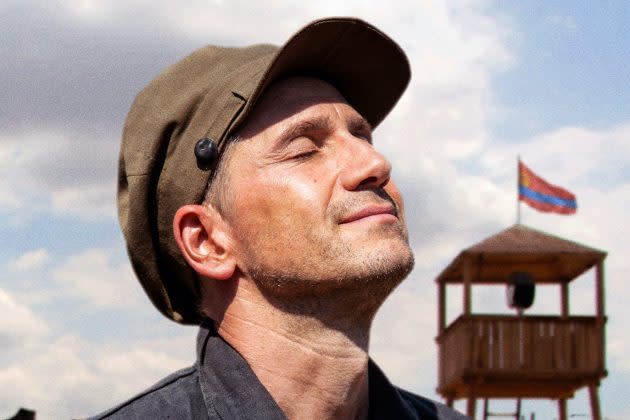‘Amerikatsi’ Review: Armenia’s Oscar Submission Is A Wayward, Blackly Comic Tale Of Hope
- Oops!Something went wrong.Please try again later.
- Oops!Something went wrong.Please try again later.
- Oops!Something went wrong.Please try again later.
- Oops!Something went wrong.Please try again later.

There’s a lot to take in and even more to process in American-Armenian director Michael Goorjian’s ambitious period piece: What he’s tilting at here is not beyond the realms of comedy, as Armando Iannucci proved with his 2017 jet-black satire The Death of Stalin. But tone is crucial, and Amerikatsi has a waywardness that too often undermines its intent — there’s a lot that works here and so much that doesn’t. There are moments that are sensitive, thoughtful, and really quite moving — in an elegant, silent-movie way — but the framing is so dark in its humor that many viewers may never make it to them.
In Eastern European literature, the greenhorn caught in the crosshairs of bureaucracy has long been a staple, and Amerikatsi pushes that tradition by placing an emigrant American at the heart of its drama. The film opens in 1915, in what was then the Ottoman Empire, and a young boy named Garo is sent away in the thick of what he will later come to know as an adult, in fevered flashbacks, as the Armenian genocide.
More from Deadline
'Inshallah A Boy' Review: Amjad Al Rasheed Eviscerates Misogyny In Oscar Submission From Jordan
'Tótem' Review: Lila Avilés Shows Extraordinary Eye For Detail In Oscar Entry From Mexico
The story itself, however, begins 30 years later, following Josef Stalin’s invitation to survivors of that dark period of history to return home, now that Armenia is part of the Soviet Union. After the death of his wife, Garo — now Charlie (Goorjian), a New Yorker from Poughkeepsie who never quite settled there — sees his chance to figure out who he really is and sets off to his homeland. By chance, after saving her son from a mob that swamps a passing bread van, the first person Charlie meets is Sona, the wife of a high-ranking Soviet general, who invites him to dinner with her husband Dmitry. Dmitry indulges his wife, promising to help Charlie find a good job and housing, too. Instead, the jealous apparatchik secretly arranges to have Charlie arrested, on the grounds that he is a spy, and sent back to America after a bit of roughing up.
Until now, there’s a goofy quality to Amerikatsi that’s reminiscent of the self-awareness that sprang up after the fall of the Berlin wall, like the fake supermarket posters in Prague’s Museum of Communism that say, “We don’t have it, we’re not open, go and bother someone else.” Charlie, on account of his “very fancy tie,” is indicted on grounds of spreading propaganda and the more speculative charge of “cosmopolitanism.” There’s a lot of dim-witted box-ticking going on (“Filling quotas is always good”), and the visual presentation — a fusion of Aki Kaurismäki, with its deadpan performances, and Wes Anderson, in its stylized use of movie grammar — has a lot of fun with that.
But instead of being let go, Charlie, after a near-miss with a firing-squad, gets sent to Siberia for 10 years hard labor. As he and others are about to get their marching orders, an earthquake hits Armenia and the prisoners are reprieved, but only so they can rebuild the prison walls. The mood is much darker now; Charlie is beaten, has his head shaved, and is sent back to his cell with a noose “for the dumb American.” The damage means that Charlie now has a view; looking out of his prison bars he can see into the home of an Armenian couple nearby. Living vicariously through their mealtimes, parties and arguments, Charlie is now inured to the brutality of his everyday existence and becomes intoxicated by theirs, living a proxy version of the authentic life he came for.
His Russian captors call him Charlie Chaplin, and with good reason, since the better part of the film is largely silent, as Charlie absorbs and gorges on the outside world much like Chaplin did as The Little Tramp in The Gold Rush. Goorjian is at his best in these scenes, which are the most effective at expressing the film’s themes of diaspora and identity. The brutality and cruelty, however, are hard to laugh off, and while it’s clearly not the film’s intention that we should ever do so, Goorjian’s film asks a lot of its audience to stay with it as a vehicle for his no doubt heartfelt thoughts of hope and reconciliation.
Title: Amerikatsi
Distributor: Variance
Release date: September 1, 2023 (Limited)
Director/screenwriter: Michael Goorjian
Cast: Michael Goorjian, Hovik Keuchkerian, Nelli Uvarova, Mikhail Trukin
Running time: 1 hour 56 min
Best of Deadline
2023 Premiere Dates For New & Returning Series On Broadcast, Cable & Streaming
2023-24 Awards Season Calendar - Dates For Oscars, Emmys, Grammys, Tonys, Guilds & More
2024 Premiere Dates For New & Returning Series On Broadcast, Cable & Streaming
Sign up for Deadline's Newsletter. For the latest news, follow us on Facebook, Twitter, and Instagram.

